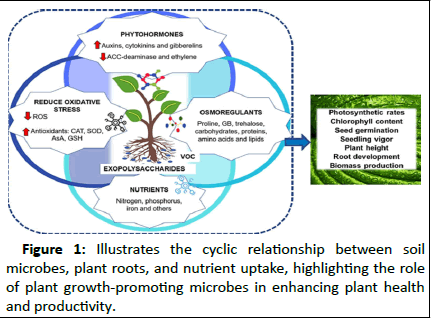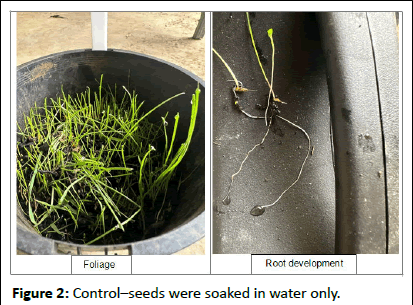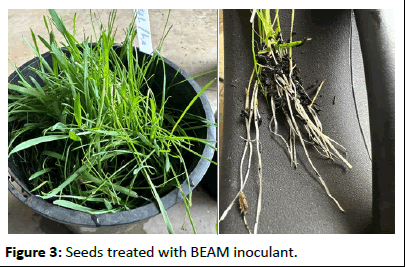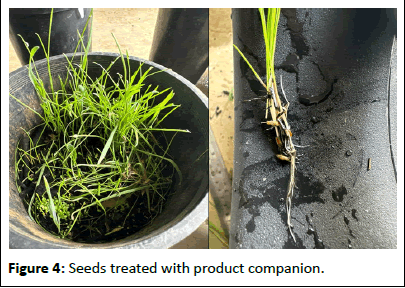ISSN : 2393-8854
Global Journal of Research and Review
Assessing the Impact of BEAM Inoculant on Plant Growth Enhancement: A Comparative Analysis
Vinesh Prasad*
Department of Soil Science and Agronomy, Central Queensland University, Rockhampton, Australia
*Corresponding Author:
- Vinesh Prasad
Department of Soil Science and Agronomy, Central Queensland University, Rockhampton, Australia
E-mail:e_alharbi@windowslive.co
Received date: May 14, 2024, Manuscript No. IPGJRR-24-19089; Editor assigned date: May 17, 2024, PreQC No. IPGJRR-24-19089 (PQ); Reviewed date: May 31, 2024, QC No. IPGJRR-24-19089; Revised date: April 21, 2025, Manuscript No. IPGJRR-24-19089 (R); Published date: April 28, 2025,
DOI: 10.36648/2393-8854.12.1.124
Citation: Prasad V (2025) Assessing the Impact of BEAM Inoculant on Plant Growth Enhancement: A Comparative Analysis. Glob J Res Rev Vol:12
No:1
Abstract
This study investigates the efficiency of BEAM (Biologically Enhanced Agriculture Management) inoculant, derived from compost produced under Dr. David Johnson-Su's composting technique, in promoting plant growth. A winter mix of pasture comprising Oats, Tetila, unhulled Couch, and Haifa was used as the test crop. Seeds were soaked in BEAM inoculant, water (control), and a competitor product 'companion.' Results revealed significant enhancements in germination rates, foliage growth, and root development in the BEAM-treated group compared to controls. Further research aims to identify the microbial components of BEAM and explore its potential as a suppressant for Fusarium species in orchards.
Keywords
BEAM inoculant; Compost extract; Seeds; Plant development; Pasture improvement
Introduction
In recent years, there has been a growing recognition of the role of compost extracts derived from various composting techniques in improving soil fertility and fostering plant growth. Compost, a valuable organic amendment, serves as a reservoir of nutrients and beneficial microorganisms essential for soil health and ecosystem functioning [1]. Dr. David Johnson-Su's composting technique has garnered considerable attention for its ability to produce compost enriched with a diverse array of beneficial microorganisms [2]. The development of BEAM (Biologically Enhanced Agriculture Management) inoculant represents a significant advancement in the field of sustainable agriculture. Derived from compost produced using Dr. Johnson- Su's composting technique, BEAM inoculant harnesses the power of beneficial microorganisms to enhance soil fertility, promote plant growth, and improve overall agricultural productivity [3]. By inoculating seeds with BEAM inoculant, farmers can introduce a diverse and beneficial microbiome to the rhizosphere, thereby facilitating symbiotic relationships between microbes and plants [4].
Pasture improvement is of paramount importance in agricultural systems, as pastures serve as a primary source of forage for livestock and play a crucial role in maintaining soil health and ecosystem stability. However, conventional pasture management practices often rely heavily on synthetic fertilizers and agrochemicals, leading to environmental degradation and soil depletion [5]. In contrast, the use of compost extracts and bio-inoculants offers a sustainable alternative that supports soil regeneration, reduces reliance on external inputs, and promotes long term agricultural resilience [6]. Central to the efficacy of compost extracts and bio-inoculants is their ability to modulate the soil microbiome and promote beneficial microbial interactions. The microbiome, comprising a diverse community of bacteria, fungi, archaea, and other microorganisms, plays a critical role in mediating nutrient cycling, soil structure formation, and plant-microbe interactions [7]. By fostering a healthy and diverse microbiome, compost extracts and bioinoculants contribute to soil health and plant vitality, enhancing the resilience of agricultural ecosystems to environmental stresses and promoting sustainable land management practices [8].
Reflecting these considerations, this study seeks to evaluate the efficacy of BEAM inoculant in promoting the growth of winter pasture and explore its potential applications in orchard management. Through a comprehensive analysis of germination rates, foliage growth, and root development, this research aims to elucidate the mechanisms underlying the beneficial effects of BEAM inoculant on soil health and plant performance [5]. By advancing our understanding of the relationship between seed inoculation, microbiome dynamics, soil health, and plant health, this study contributes to the development of sustainable agricultural practices that support ecological integrity, economic viability, and social well-being [9].
The investigation aimed to assess the impact of three distinct treatments–BEAM inoculant, water (control), and a competitor product 'companion'–on the growth dynamics of a winter pasture mix comprising Oats, Tetila, unhulled Couch, and Haifa. A comprehensive evaluation spanning 10 days was conducted to scrutinize the germination rates, foliage growth patterns, and root development trajectories across the treatment groups.
Utilizing statistical analysis via ANOVA enabled the discernment of significant variances among the treatment modalities.
Literature Review
Compost extracts and bio-inoculants have emerged as promising tools in sustainable agriculture, leveraging the beneficial properties of compost-derived microorganisms to enhance soil fertility and promote plant growth. Compost, a rich source of organic matter and nutrients, serves as a reservoir for diverse microbial communities essential for soil health [1]. Dr. David Johnson-Su's composting technique, renowned for its ability to produce compost enriched with a diverse array of beneficial microorganisms, has been instrumental in advancing the field of biologically enhanced agriculture management [2].
Research indicates that compost extracts derived from Dr. Johnson-Su's composting technique contain a plethora of beneficial microorganisms, including bacteria, fungi, and archaea, which contribute to soil health and plant vitality [3]. These microorganisms play crucial roles in nutrient cycling, organic matter decomposition, and disease suppression, thereby enhancing soil fertility and promoting plant growth. Furthermore, conventional pasture management practices often rely on synthetic fertilizers and agrochemicals, leading to environmental degradation and soil depletion [6]. In contrast, the use of compost extracts and bio-inoculants offers a sustainable alternative that supports soil regeneration and reduces reliance on external inputs. Studies have shown that the application of compost extracts and bio-inoculants can improve soil structure, increase nutrient availability, and enhance plant resistance to biotic and abiotic stresses [8].
Central to the efficacy of compost extracts and bio-inoculants is their ability to modulate the soil microbiome and promote beneficial microbial interactions [8]. The soil microbiome comprises a diverse community of microorganisms that play critical roles in soil processes and plant health [7]. By fostering a healthy and diverse microbiome, compost extracts and bioinoculants contribute to soil health and plant vitality, ultimately enhancing the resilience of agricultural ecosystems to environmental stresses. In the context of pasture improvement and orchard management, the efficacy of compost extracts and bio-inoculants in promoting plant growth and enhancing soil health has been demonstrated in numerous studies [10]. Kalia, et al., also mentioned that these interventions have been shown to increase crop yields, improve soil structure, and reduce the need for synthetic inputs, thereby promoting sustainable land management practices.
Overall, the literature supports the use of compost extracts and bio-inoculants as valuable tools for sustainable agriculture, offering potential benefits for soil health, plant growth, and environmental sustainability. Further research is needed to explore their mechanisms of action, optimize application methods, and assess their long-term effects on soil health and ecosystem functioning.
Methodology
The findings revealed a discernible influence of the applied treatments on the growth parameters of the winter pasture mix. Notably, seeds treated with BEAM inoculant exhibited pronounced enhancements in various growth facets compared to their counterparts subjected to water (control) or the competitor product 'companion.' Specifically, the germination rates were notably higher in the BEAM-treated group, indicative of a more conducive germination environment facilitated by the inoculant's bioactive constituents.
Moreover, an observable disparity in foliage growth emerged, with the BEAM-treated seeds demonstrating a notably more robust and vigorous foliar development trajectory relative to the other treatment cohorts. This accelerated foliage growth may be attributed to the bio-stimulant properties inherent in the BEAM inoculant, potentially augmenting photosynthetic efficiency and biomass accumulation. Root development dynamics further underscored the efficacy of the BEAM inoculant, as evidenced by the formation of extensive and intricate root systems in the treated samples. In contrast, seeds treated with water, or the competitor product exhibited comparatively subdued root proliferation, indicating a diminished capacity for nutrient acquisition and soil exploration.
These findings collectively underscore the potential of BEAM inoculant as a sustainable agronomic intervention for enhancing the growth performance of winter pasture mixes. By fostering favorable conditions for germination, promoting robust foliar expansion, and stimulating vigorous root development, the application of BEAM inoculant holds promise in bolstering crop productivity, enhancing soil health, and advancing the principles of sustainable agriculture. Further research endeavors are warranted to elucidate the underlying mechanisms driving the observed growth responses and to explore the broader implications of BEAM inoculant application across diverse agroecological contexts. *Prior permission was obtained from Fernland (ABN: 89 144 613 936) to utilize their product companion as a competitor in the experiment [11].
Results
Seeds subjected to the BEAM inoculant treatment displayed notable outcomes, with a robust 98% germination rate observed alongside substantial foliage growth, measuring between 12 to 14 centimetres by the 10th day post-sowing. Moreover, the root system exhibited prolific development characterized by the formation of extensive root clusters. In stark contrast, control groups treated solely with water demonstrated comparatively inferior results, manifesting an 80% germination rate and minimal foliage growth ranging from 2 to 4 centimetres.
Furthermore, root development in the control groups remained limited, with minimal cluster formation observed. Seeds treated with the competitor product 'companion' exhibited intermediary results, displaying an 87% germination rate and foliage growth ranging from 6 to 8 centimetres. However, root development in 'companion'-treated seeds was notably less pronounced compared to those treated with the BEAM inoculant. These findings underscore the efficacy of the BEAM inoculant in promoting germination, foliage growth, and root development, thereby highlighting its potential as a viable option for enhancing agricultural productivity and sustainability [12].
Discussion
The findings of this study underscore the significant role of compost extracts, particularly the BEAM inoculant derived from Dr. David Johnson-Su's composting technique, in promoting plant growth and enhancing soil health. The observed outcomes align closely with the literature, which highlights the potential of compost-derived microorganisms to improve soil fertility and foster plant development [1,2]. Our results demonstrate that seeds treated with the BEAM inoculant exhibited substantially higher germination rates, increased foliage growth, and more robust root development compared to control groups treated with water only or a competitor product.
These findings corroborate previous research suggesting that compost extracts and bio-inoculants offer a sustainable alternative to conventional agricultural practices, promoting soil regeneration and reducing reliance on synthetic inputs [6,8]. Central to the efficacy of compost extracts and bioinoculants is their ability to modulate the soil microbiome, fostering beneficial microbial interactions that contribute to soil health and plant vitality [7].
Figure 1 illustrates the cyclic relationship between soil microbes, plant roots, and nutrient uptake, emphasizing the pivotal role of plant growth promoting microbes in enhancing plant health and productivity. This visual representation reinforces the importance of harnessing beneficial microorganisms, such as those found in the BEAM inoculant, to optimize soil-plant interactions and promote sustainable agricultural practices [13].
Figure 1: Illustrates the cyclic relationship between soil microbes, plant roots, and nutrient uptake, highlighting the role of plant growth-promoting microbes in enhancing plant health and productivity.
In summary, our findings contribute to the growing body of evidence supporting the use of compost extracts and bioinoculants as effective tools for enhancing soil health and promoting plant growth. Further research is warranted to elucidate the underlying mechanisms of action, optimize application methods, and assess the long-term effects of these interventions on soil fertility and ecosystem functioning [14]. By advancing our understanding of the complex interplay between soil microbiota, plant health, and agricultural productivity, we can develop more resilient and sustainable land management practices for the benefit of both current and future generations (Figures 2-4) [4].
Figure 2: Control–seeds were soaked in water only.
Figure 3: Seeds treated with BEAM inoculant.
Figure 4: Seeds treated with product companion.
Conclusion
In conclusion, the results of this study highlight the efficacy of BEAM inoculant derived from compost extracts in promoting plant growth and enhancing soil health. Through increased germination rates, enhanced foliage growth, and robust root development, seeds treated with the BEAM inoculant demonstrated superior performance compared to control groups. These findings are consistent with existing literature, underscoring the potential of compost-derived microorganisms to improve agricultural productivity and sustainability. Moreover, the discussion emphasizes the importance of compost extracts and bio-inoculants in modulating the soil microbiome, fostering beneficial microbial interactions, and promoting soil health. Visual representation in Figure 1 illustrates the cyclic relationship between soil microbes, plant roots, and nutrient uptake, reinforcing the role of plant growthpromoting microbes in enhancing plant health and productivity.
Further, investigation is underway to isolate and identify the specific fungi and bacteria present in the BEAM inoculant that contribute to such robust growth. This ongoing research will deepen our understanding of the mechanisms underlying the beneficial effects of compost extracts and bio-inoculants, informing future agricultural practices and strategies for sustainable land management. In summary, the findings of this study contribute to the growing body of evidence supporting the use of compost-derived products as valuable tools for enhancing agricultural productivity and promoting soil health. By harnessing the power of beneficial microorganisms, such as those found in the BEAM inoculant, we can cultivate resilient and sustainable agricultural ecosystems that benefit both farmers and the environment.
References
- JG Press (1993) Compost science and utilization. JG Press Inc. Emmaus, PA, USA 11:181
[Crossref]
- Johnson D, de Simio P (2017) Best management practices: Johnson-su composting bioreactors. Regeneration International: New Mexico State University
- Saad MM, Eida AA, Hirt H (2020) Tailoring plant-associated microbial inoculants in agriculture: A roadmap for successful application. J Exp Bot 71:3878-3901
[Crossref] [Google Scholar] [PubMed]
- Lopes MJ, Dias-Filho MB, Gurgel ES (2021) Successful plant growth-promoting microbes: Inoculation methods and abiotic factors. Front Sustain Food Syst 5:606454
- Tully KL, McAskill C (2020) Promoting soil health in organically managed systems: A review. Org Agr 10:339-358
- Ahmad A, Zafar U, Khan A, Haq T, Mujahid T, et al. (2022) Effectiveness of compost inoculated with phosphate solubilizing bacteria. J Appl Microbiol 133:1115-1129
[Crossref] [Google Scholar] [PubMed]
- Liu X, Shi Y, Kong L, Tong L, Cao H, et al. (2022) Long-term application of bio-compost increased soil microbial community diversity and altered its composition and network. Microorganisms 10:462
[Crossref] [Google Scholar] [PubMed]
- Chaudhary P, Chen S, Rajput VD, Jaiswal DK (2023) Bioinoculants with nano-compounds to improve soil health: A step toward sustainable agriculture. Front Environ Sci 11:1270002
- Zhang X, Ma YN, Wang X, Liao K, He S, et al. (2022) Dynamics of rice microbiomes reveal core vertically transmitted seed endophytes. Microbiome 10:216
[Crossref] [Google Scholar] [PubMed]
- Kalia A, Sharma SP, Kaur S, Kaur H (2020) Bacterial inoculants: How can these microbes sustain soil health and crop productivity?. Soil Biol 59:337-372
- Amuah EE, Fei-Baffoe B, Sackey LN, Douti NB, Kazapoe RW (2022) A review of the principles of composting: Understanding the processes, methods, merits, and demerits. Org Agr 12:547-562
- Shi H, Zhu X, Lu L, Ye J (2024) Effect of microbial inoculants endowed with multifarious plant growth-promoting traits on grape growth and fruit quality under organic fertilization scenarios. Agronomy 14:491
- Chachere P, Gupta S (2014) A comparative study of efficiency of bio-inoculants (VAM, Trichoderma, Azospirillum and PBS) on crop plants (P. Vulgaris, Zeamays, Arachis hypogaea and Eleusine coracana). Int J Res Biosci Agric Technol (Special Issue):267-274.
- Elnahal AS, El-Saadony MT, Saad AM, Desoky ES, El-Tahan AM, et al. (2022) The use of microbial inoculants for biological control, plant growth promotion, and sustainable agriculture: A review. Eur J Plant Pathol 162:759-792.
Open Access Journals
- Aquaculture & Veterinary Science
- Chemistry & Chemical Sciences
- Clinical Sciences
- Engineering
- General Science
- Genetics & Molecular Biology
- Health Care & Nursing
- Immunology & Microbiology
- Materials Science
- Mathematics & Physics
- Medical Sciences
- Neurology & Psychiatry
- Oncology & Cancer Science
- Pharmaceutical Sciences




